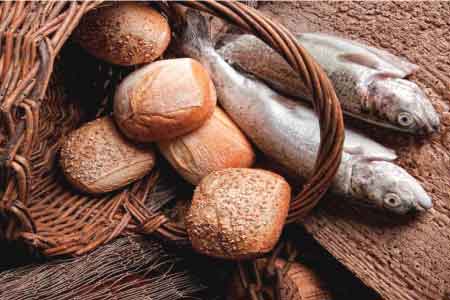
“Jesus replied, “They do not need to go away. You give them something to eat.” “We have here only five loaves of bread and two fish,” they answered. “Bring them here to me,” he said. And he directed the people to sit down on the grass. Taking the five loaves and the two fish and looking up to heaven, he gave thanks and broke the loaves. Then he gave them to the disciples, and the disciples gave them to the people. They all ate and were satisfied, and the disciples picked up twelve basketfuls of broken pieces that were left over. The number of those who ate was about five thousand men, besides women and children.” (Matt 14:16-21 NIV).
“They do not need to go away. You give them something to eat.” (Matt 14:16) was the response Jesus gave his disciples when they suggested that He send His audience away to find food, since it was getting late. Though they were rightly concerned about the welfare of that crowd of people, Jesus caught them off guard with His response. How could He expect them to feed such a mammoth crowd? Many of us today can identify with the disciples of Jesus in that regard. We have known times when what God commanded us to do was simply humanly impossible. We have known situations in which our human resources have unfortunately paled into insignificance, relative to the responsibility we have been given. That was exactly the situation of those disciples at that moment. Is it not just like God to demand for something beyond our ability to do or give?
The response of the disciples to Jesus is instructive: “We have here only five loaves of bread and two fish,” (Matt 14:17). Their sense of inadequacy was obvious and understandable. How could anyone with just five loaves of bread and two fish feed a hundred adults, let alone thousands of people? Truly, this is impossible with men (Matt 19:26). There is no gain saying the fact that mankind is largely limited. It is usually a phenomenal breakthrough when people come to realize their impotence without God. Sometimes, God has to allow us fail repeatedly, before it finally dawns on us that we can do nothing without Him. Until we have this revelation and embrace it wholeheartedly, we are not yet ready to experience divine intervention on a consistent basis.
The main reason why we become fearful is our awareness of our inability to control or determine the outcome of circumstances around us. Once we feel we are losing or have lost control of a situation, we become anxious. This usually leads to a defeatist mentality, which in turn, leads to self-defeating behaviour. However, we do not need to be in control of every circumstance around us, we only need to know and rest assured in the infallible and self-sufficient God, whose assurances and promises guarantee us His constant presence, irrespective of our situation. As our constant companion, God has promised to strengthen us, to help us, and to uphold us with His righteous right hand (Isa 41:10). Hence, He commands us to “fear not.”
“They do not need to go away. You give them something to eat.” (Matt 14:16). Oh! How many people have gone away from us empty handed and disappointed because, contrary to God’s will, we have looked in the wrong direction—to ourselves, our abilities, our connections our experiences etc. Though the disciples were factually incapable of meeting the need on ground, that fact was not supposed to be final. God does not assess your eligibility for an assignment on the basis of your natural human resources. He does not wait for you to qualify by human standards, before He selects you. Rather, He qualifies you by choosing you. The moment Jesus instructed His disciples to feed the crowd, they instantly became qualified to do so.
Once God has called you to do something, you can rest assured that He has provided everything necessary to enable you do it successfully. God’s grace is always sufficient for His work. However, like the disciples, it is important that you learn to follow His instructions carefully. First, Jesus commanded His disciples to bring the little they had to Him. Next, He instructed the multitude to sit down on the grass. Then, with the few loaves and fish in His hands, looked up to heaven and gave thanks. Finally, He broke the loaves and gave them to His disciples to give the people. Then the miracle began! As the disciples of Jesus humbly received the loaves from Him and shared them among the people, they multiplied until “…They all ate and were satisfied, and the disciples picked up twelve basketfuls of broken pieces that were left over.” (Matt 14:20 NIV). Hallelujah! Five loaves of bread and two fish were all the disciples started out with. But because they listened to Jesus and obeyed His instructions, so little was able to feed so many. Shalom.